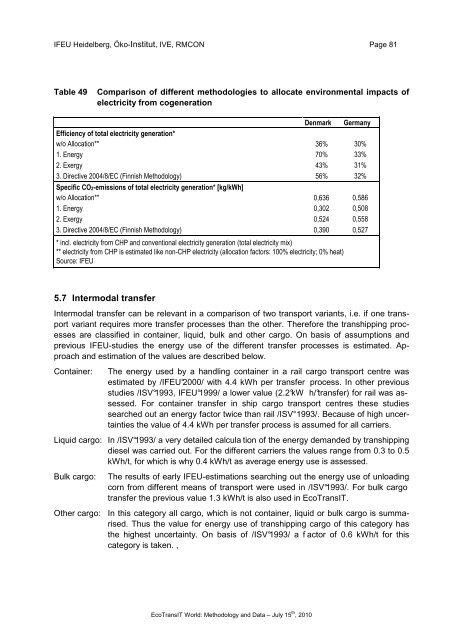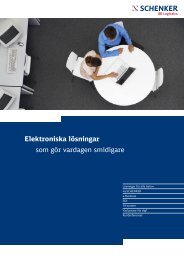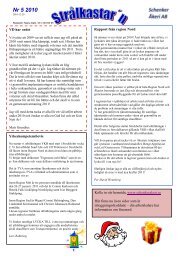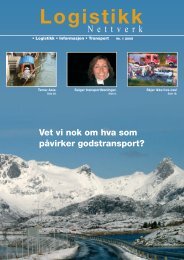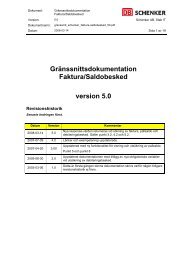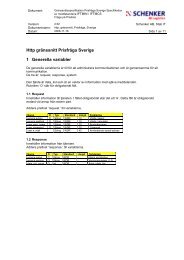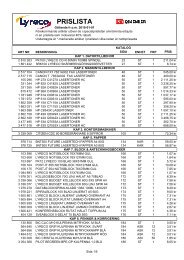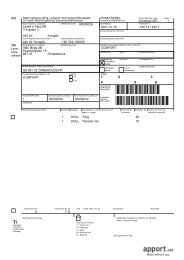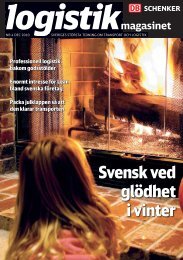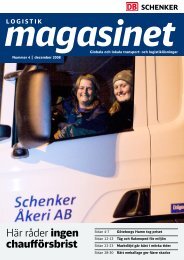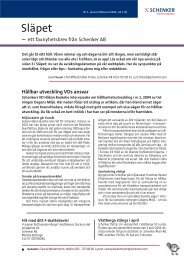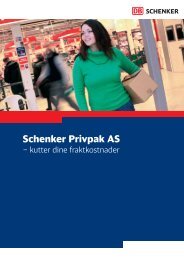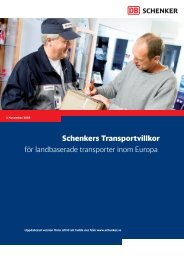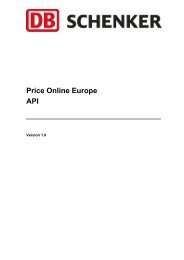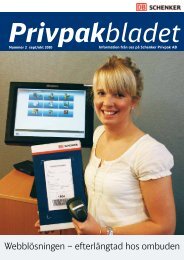Ecological Transport Information Tool for Worldwide ... - Schenker
Ecological Transport Information Tool for Worldwide ... - Schenker
Ecological Transport Information Tool for Worldwide ... - Schenker
Create successful ePaper yourself
Turn your PDF publications into a flip-book with our unique Google optimized e-Paper software.
IFEU Heidelberg, Öko-Institut, IVE, RMCON Page 81<br />
Table 49<br />
Comparison of different methodologies to allocate environmental impacts of<br />
electricity from cogeneration<br />
Denmark Germany<br />
Efficiency of total electricity generation*<br />
w/o Allocation** 36% 30%<br />
1. Energy 70% 33%<br />
2. Exergy 43% 31%<br />
3. Directive 2004/8/EC (Finnish Methodology) 56% 32%<br />
Specific CO2-emissions of total electricity generation* [kg/kWh]<br />
w/o Allocation** 0,636 0,586<br />
1. Energy 0,302 0,508<br />
2. Exergy 0,524 0,558<br />
3. Directive 2004/8/EC (Finnish Methodology) 0,390 0,527<br />
* incl. electricity from CHP and conventional electricity generation (total electricity mix)<br />
** electricity from CHP is estimated like non-CHP electricity (allocation factors: 100% electricity; 0% heat)<br />
Source: IFEU<br />
5.7 Intermodal transfer<br />
Intermodal transfer can be relevant in a comparison of two transport variants, i.e. if one transport<br />
variant requires more transfer processes than the other. There<strong>for</strong>e the transhipping processes<br />
are classified in container, liquid, bulk and other cargo. On basis of assumptions and<br />
previous IFEU-studies the energy use of the different transfer processes is estimated. Approach<br />
and estimation of the values are described below.<br />
Container:<br />
The energy used by a handling container in a rail cargo transport centre was<br />
estimated by /IFEU°2000/ with 4.4 kWh per transfer process. In other previous<br />
studies /ISV°1993, IFEU°1999/ a lower value (2.2°kW h/°transfer) <strong>for</strong> rail was assessed.<br />
For container transfer in ship cargo transport centres these studies<br />
searched out an energy factor twice than rail /ISV°1993/. Because of high uncertainties<br />
the value of 4.4 kWh per transfer process is assumed <strong>for</strong> all carriers.<br />
Liquid cargo: In /ISV°1993/ a very detailed calcula tion of the energy demanded by transhipping<br />
diesel was carried out. For the different carriers the values range from 0.3 to 0.5<br />
kWh/t, <strong>for</strong> which is why 0.4 kWh/t as average energy use is assessed.<br />
Bulk cargo:<br />
The results of early IFEU-estimations searching out the energy use of unloading<br />
corn from different means of transport were used in /ISV°1993/. For bulk cargo<br />
transfer the previous value 1.3 kWh/t is also used in EcoTransIT.<br />
Other cargo: In this category all cargo, which is not container, liquid or bulk cargo is summarised.<br />
Thus the value <strong>for</strong> energy use of transhipping cargo of this category has<br />
the highest uncertainty. On basis of /ISV°1993/ a f actor of 0.6 kWh/t <strong>for</strong> this<br />
category is taken. ,<br />
EcoTransIT World: Methodology and Data – July 15 th , 2010


